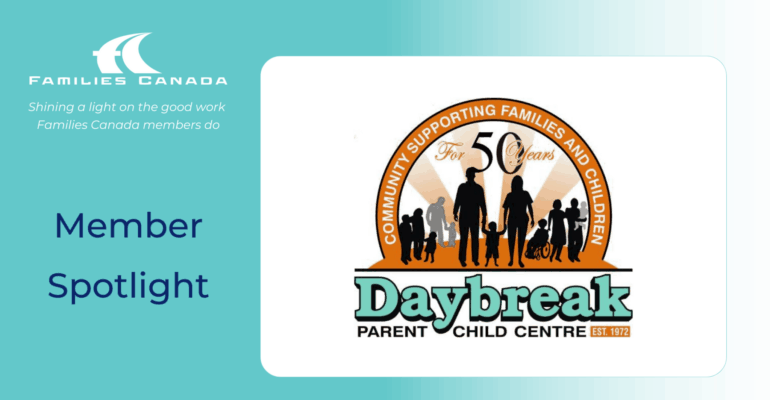 21 May 2024
21 May 2024
Quality Programming and a Well-Trained Team Supporting Families in St. John’s Newfoundland
Last April we had the privilege of working with Tricia Robinson to bring you the Member Spotlight series on South Winnipeg Family Information Center. We’re happy that this member-focused feature allows us to invite, get to know and introduce a Families Canada member each month to share their experiences, best practices, challenges and more in their work with families. We encourage our members to connect with each other and thrive together as we support and strengthen families across Canada.
Our Member Spotlight for May 2024 is Renee Williams, Executive Director at Daybreak Parent Child Centre in St. John’s, Newfoundland. Thank you, Renee Williams, for sharing your organization with our members.
About Renee
Hi Renee! Please tell us about yourself, your role and what motivated you to join Daybreak Parent Child Centre.
Renee Williams, Executive Director Director at Daybreak Parent Child Centre (Daybreak)
My name is Renee Williams, I have worked at Daybreak for almost 12 years and am the current Executive Director at Daybreak Parent Child Centre in St. John’s, Newfoundland. I am a registered social worker with a master’s in social work from Memorial University of Newfoundland.
For the first 10 years I worked as the Manager of the Family Home Visitation Program, a goal-based home visiting program for high-risk families involved with child protection. In June of 2022 I became the Executive Director at a time of reflection and growth for Daybreak. In 2022 we began updating our strategic plan to better outline our purpose and vision for the future which will be officially launched in June 2024, although improvements have been implemented throughout the process. I remain invested in the families, staff, volunteers, and Board of Directors at Daybreak Parent Child Centre; as I believe in the family system approach to supporting children and families that we have maintained for over 51 years.
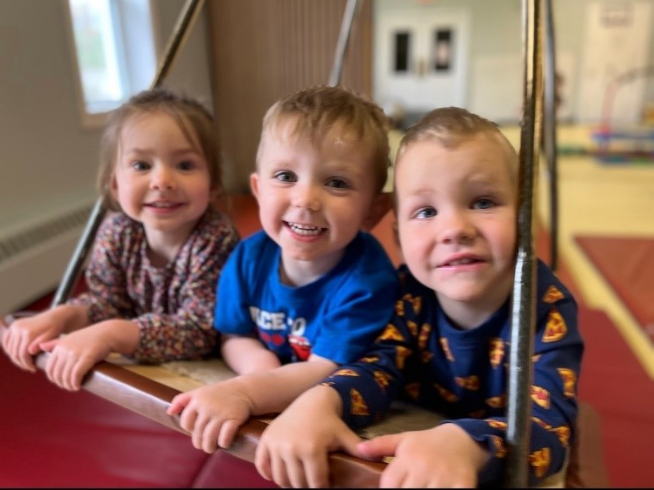
About Daybreak Parent Child Centre (Daybreak)
Please tell us about Daybreak and the needs or challenges in the community that Daybreak is responding to.
Renee: Daybreak is a not-for-profit, government funded agency that offers supportive services to families looking for additional support. Support and services are offered to families through a variety of programs.
Staff at Daybreak deliver high quality programming that is trauma informed, family centered, and evidence-based and attempt to address the complex needs of the community such as mental health and addictions, food insecurity, poverty, and homelessness. Families of all socioeconomic status and backgrounds are welcomed and programs are adapted and created in response to the needs presented. Particularly since the onset of the COVID 19 global pandemic, families have expressed feelings of more stressors than ever, and the needs of families have become more complex. Staff strive to build relationships with families first to determine how best to engage and what the specific needs are.
Programs & Services
- The Children's Program offers licensed childcare for children aged 18 months to 5 years and their families.
- The Family Support and Community Programs offer family resource-based services in the form of outreach and advocacy focused on removing barriers, psychoeducational parent groups, early learning parent-child attachment support groups, prenatal educational and peer groups, post-natal parent-child groups and mental health and wellness groups, social groups, newcomer focused support, food security programs, transportation, and childminding for children not in licensed care.
- The Family Home Visitation Program is a goal-based home visiting program created for high-risk families involved with child protection and the focus is to enhance parent-child attachment, improve child development, increase existing parental knowledge, reduce risk for children, and connect families to supportive services in their community. Staff are trained to respond to various needs such as neurodiverse children, children needing specialized programming, sensory needs, multigenerational trauma, and newcomer families. Family support is offered to families with children in licensed care as well as parents in the community looking for more support.
Relationship with Families Canada
Can you tell us about your organization’s relationship with Families Canada?
Renee: Daybreak is honored to be a member of Families Canada for the past 20 years and we have availed of a variety of training opportunities and conferences. Resources such as the Families Canada quality and impactful initiatives, projects, and active support, have contributed to the focus on high quality programming for Daybreak and the importance of family engagement. Over the past 20 years Daybreak has been involved in several projects with Families Canada including:
- Annual National Conferences starting 2003
- NPPP Training and Programming since 2004 (currently involved in NPPP Planning Conference for 2024 and National Project of developing Virtual NPPP program guides)
- Families as E-consumers: Attitudes, Behaviors and Barriers to E-information 2009
- Bookmates Training 2011
- Family Resource Centers: Community Settings that Support Social Inclusion 2010-2012
- National Roundtable on Family Supports Committee 2021-2022
- Together for Families Conference Planning Committee 2021 and 2023
Daybreak continues to look for opportunities to work with Families Canada, to further build on our relationship.
"I am so happy my girls meet you, with your smile, and kindness. Even if they may not remember later the program, they are going to remember the kindness, the friendship, and the love you gave to her, and I am sure it will help them to be more confident in their life!"
Collaboration and Partnerships
How does your organization collaborate with other organizations or agencies to enhance your services and ability to support families?
Renee: For over 51 years Daybreak has continued to develop partnerships and/or collaborative relationships using a community development, community capacity building, community collaboration and asset mapping approaches with individuals (including families), agencies, government, professional groups and others who have a shared interest in the philosophy and work of Daybreak. These partnerships increase the efficiency and effectiveness of the programs from a financial, human resource and quality perspective. At present, there are over 25 meaningful partnerships, with other similar community agencies, schools, churches, and professional groups, and the local college and university.
Another example of Daybreak’s approach to collaboration is our relationship with our local children’s hospital. This longstanding partnership has developed to the point that various professionals such as Occupational Therapists, Physiotherapists, Speech Language Pathologists, etc. work with Daybreak staff on-site to further support the early development of children enrolled in our Children’s Program.
Efforts are made whenever possible to bring services into our agency to reduce barriers for families as well as reduce the time needed for children in licensed care to have to leave the center to attend appointments. Through collaboration and partnership with Intervention Services, a recent example of these efforts is the Jasper Program, which will be delivered at Daybreak to children, either enrolled or waitlisted for Daybreak Programs. JASPER (Joint Attention, Symbolic Play, Engagement, and Regulation) is a play-based intervention that teaches social communication skills to young children with autism, developed by Dr. Connie Kasari at the University of California. This pilot is ongoing, and the hope is that there will be shorter wait times and families will face less barriers when trying to access this service.
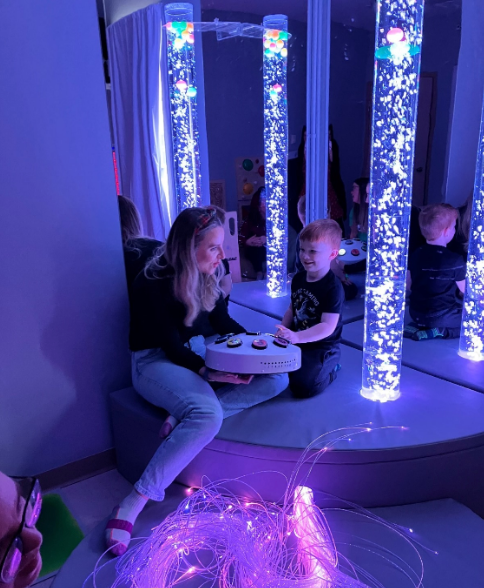
Challenges and Solutions
Every organization faces challenges. Can you discuss some challenges your organization has encountered and the strategies implemented to overcome them? How has the organization adapted and evolved to meet the changing needs of the community?
Renee: Daybreak Parent Child Centre is a not-for-profit community-based agency that is government funded by the Departments of Education and the Department of Children, Seniors, and Social Development Government of Newfoundland Labrador. One of the main challenges for our agency is responding to increasing demands from families for support and services that remove barriers with minimal increases to our overall budget. Staff and management have continued to be creative while responding to family demands while remaining fiscally responsible and doing ‘more with less’. Community capacity building has been crucial to our success and longstanding history, and we continue to remain asset focused and rely on the strengths of staff, community partners, and families to grow and adapt programming.
Challenges such as food insecurity and poverty for families have continued to impact our community and we struggle to respond to this challenge given the rising cost of food and materials without a significant funding increase. Families communicate struggling to make ends meet and hunger is a persistent challenge for children and families. We have responded to this challenge by expanding our longstanding food pantry to include toiletry items and necessities such as toilet paper and baby items in addition to including food in all programs.
With the increased rates of homelessness in Newfoundland Labrador, food insecurity has only become more complex as families communicate an inability to prepare food items received from our food pantry or other community food banks. One mother voiced her concern with preparing pantry food items following her heat and lights being temporarily disconnected and we responded to this challenge with the creation of a food takeaway program. This program involves staff preparing family meals in takeaway containers that only require re-heating. The hope is to further expand this program to include more families as demand has been high for this program.
"An example of a significant positive impact on a family’s life was a single mother and 2-year-old child that were involved in the Children’s Program and availed of family support. In collaboration between the Daybreak programs, this mother was supported to go back to school, was successful in obtaining her high school equivalency (GED) and has enrolled in post-secondary education. This family attended Daybreak for over 2 years, and her child was supported to transition into a Pre-K program in her neighborhood, where she will attend Kindergarten."
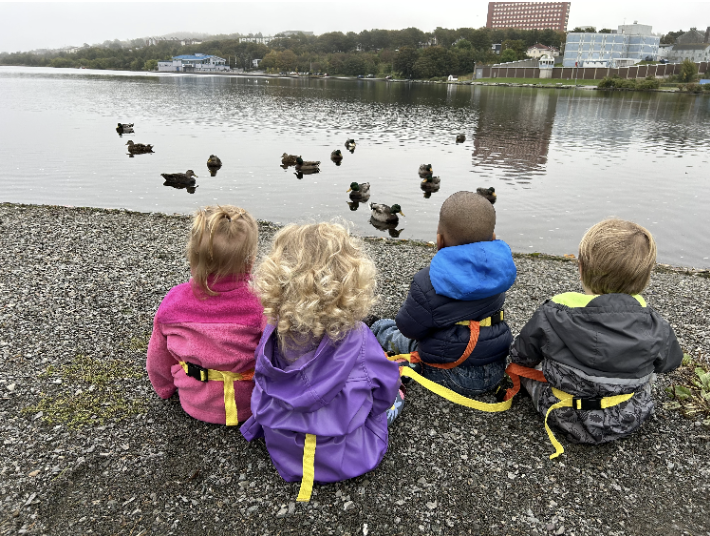
Measuring Success
How does your organization measure its success and impact on families and the community?
Renee: Parenting is challenging, and we celebrate alongside families their successes both big and small and we look to families to define what success looks like. We rely on outcome measurement tools to measure the amount, type, and quality of contacts with families and use this information to inform how best to engage with families. As noted, evaluation is also built into each program such that families are asked to reflect on the type, quality, and experience with Daybreak.
High-quality training for staff remains our focus and facilitator training that allows for continued training in-house. Evidence-based screening tools such as the ASQ3 and ASQ SE2 developmental screening tools are utilized as well as the emergent curriculum and a high standard of practice with respect to documentation.
As a not-for-profit agency, we are overseen by a volunteer Board of Directors that operate as a policy governance board and it is my role to provide evidence in the form of monitoring reports that reflect satisfactory progress with respect to our mission and policies. The management team also updates the Board on each program and provides statistics on the number of families engaged, successes and challenges. The strategic planning process that we have embarked on will also help to ensure we have a clear purpose and vision for the future and that we are meeting the needs of children and families.
Success Stories
Are there any particular cases or situations that stand out to you as examples of the organization's success?
Renee: Daybreak is very family focused and staff celebrate successes big and small based on the feedback from families and their respective goals and needs. Family engagement is celebrated as this is a primary focus for all staff who strive to create individualized learning opportunities for children and families that are based on family goals. Success is then often measured by the family’s own perception of their experiences and improvements in family functioning and parent-child attachment.
Child development is also a priority for staff at Daybreak as programming is aligned with the respective stage in development for each child. All staff have training in administering the Ages and Stages 3 and Ages and Stages Social Emotional 2 developmental measurement tools, which are utilized to monitor child development and to help support families. Collaboration and advocacy are priorities for staff, particularly when child development is a concern and service providers are encouraged to meet children and families at Daybreak to remove barriers and improve outcomes.
Staff also strive to meet families where they are and often success is measured by assisting families by removing barriers and accessing basic human rights and needs. A recent success story in the Family Home Visitation Program (FHVP) involved a young mother, whom had no familial or social support, was struggling with mental illness, and was not permitted unsupervised access with her child, as assessed by child protection. This mother faced many barriers before starting with Daybreak FHVP in Summer of 2023 and at present, she is thriving and actively engaged with both the FHVP, as well as the Children’s Program, where her child has been accepted. Many staff at Daybreak have since commented on the significantly positive attachment between the mother and her child, noting her strong parenting skills.
Community Impact
How has your organization contributed to the overall well-being of the community it serves?
Renee: Community needs assessments have remained a priority for Daybreak as this knowledge guides staff to be responsive to the changing needs of the community it serves. An example of this has been ensuring inclusive supports and programming are available, particularly for children who are not successful in other childcare settings and programs. Efforts have continued throughout the history of Daybreak to create programs that are responsive to identified children, family, and parenting needs, even when additional funding is not available. Responding to intergenerational trauma, sensory needs, complex behaviors, and attachment disorders has remained a priority for Daybreak and staff receive extensive training in these areas.
In January 2023 Daybreak was awarded funding from the Enabling Accessibility Fund with the Federal Government of Canada to create our own in house multi-sensory Snoezelen room. Daybreak was fortunate to have a visit from Honorable Joanne Thompson, MP in February 2023 for the official announcement. The room is close to completion and children have begun utilizing the room with staff being supported by Occupational Therapists in the creation of individualized sensory diets for children.
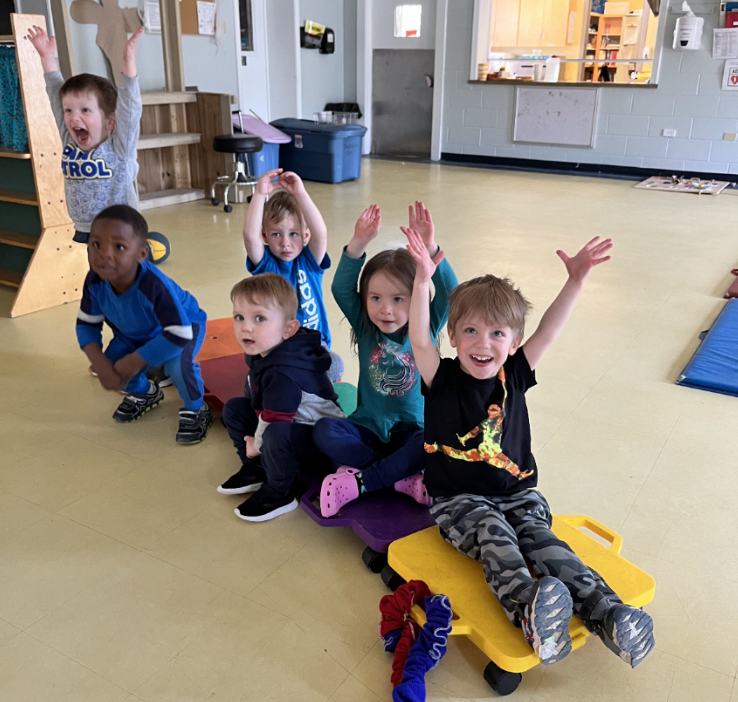
Future Goals
What are your organization’s future goals and how does your organization envision continuing to make a positive difference in the lives of families in the coming years?
Renee: As I look up and out towards the future of this agency, I am energized by the dedication of staff and honored to lead this organization forward. I am excited to complete our strategic planning process to determine how best to honor our 51-year history, while creating a new vision for the future. Over the past year we have engaged a consultant to lead this process by engaging with families, staff, stakeholders, and community partners to help guide the Board of Directors in determining our purpose, vision and values for the future. Once this is complete the plan is to rebrand to reflect current and future programs, support and services offered by Daybreak and to ensure we continue to make a positive difference in the lives of families in the future.
As Executive Director, I am committed to improving the quality of programs for children and their families through innovation, creativity, and trauma responsiveness. This includes improving access to quality equipment, space, and community software such as an integrated agency wide database. I am also hopeful to expand the current Family Support program to offer additional outreach services and to expand the current Takeaway Meals program with a focus on food insecurity and food literacy.
Connect with Daybreak Parent Child Centre
Connect with the Community
We at Families Canada enjoy and are inspired by the good work that our members do. We are grateful to Renee and other members who have accepted our invitation to help us launch this initiative and foster connection among members.
We would love to learn more about the work Families Canada members do with families across Canada. Our whole community benefits from our shared experiences. We invite you to share your story by getting in touch with our Membership Team at info@familiescanada.ca today.
Images courtesy of Daybreak Parent Child Centre




Families Canada